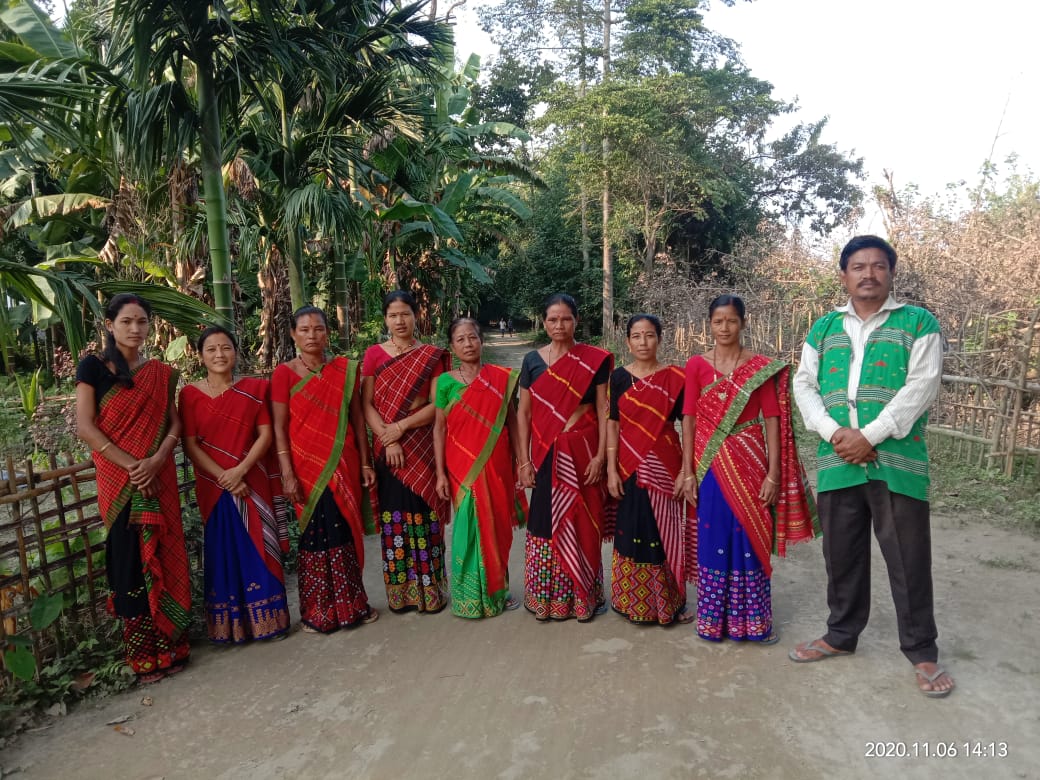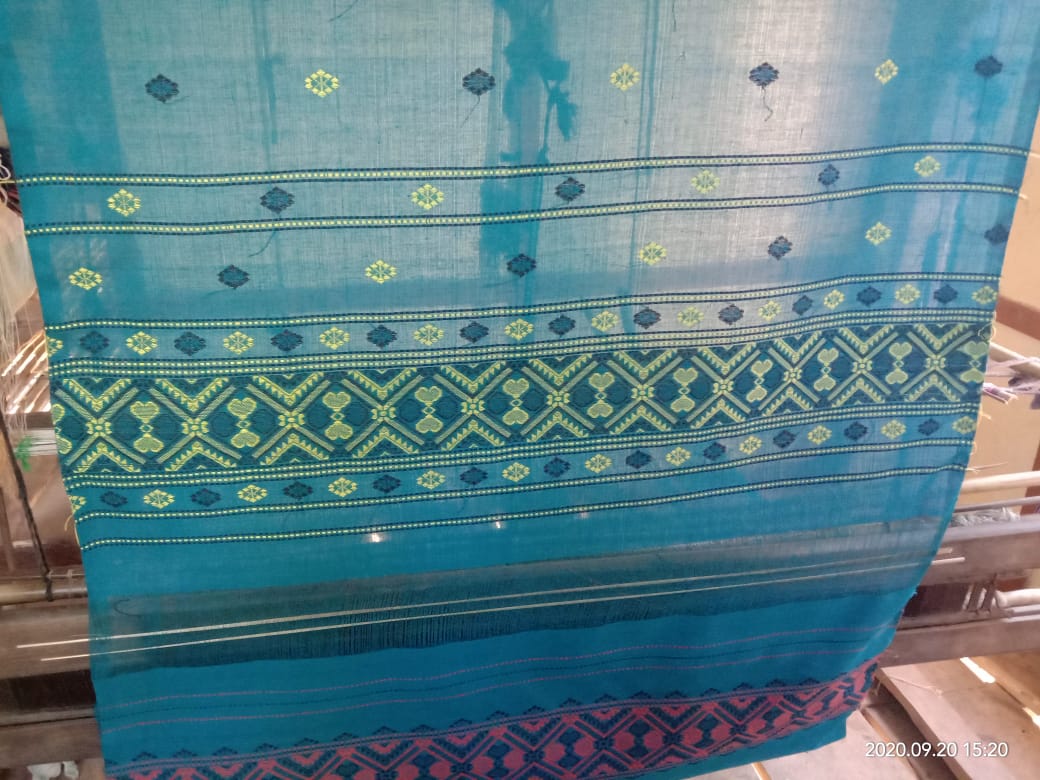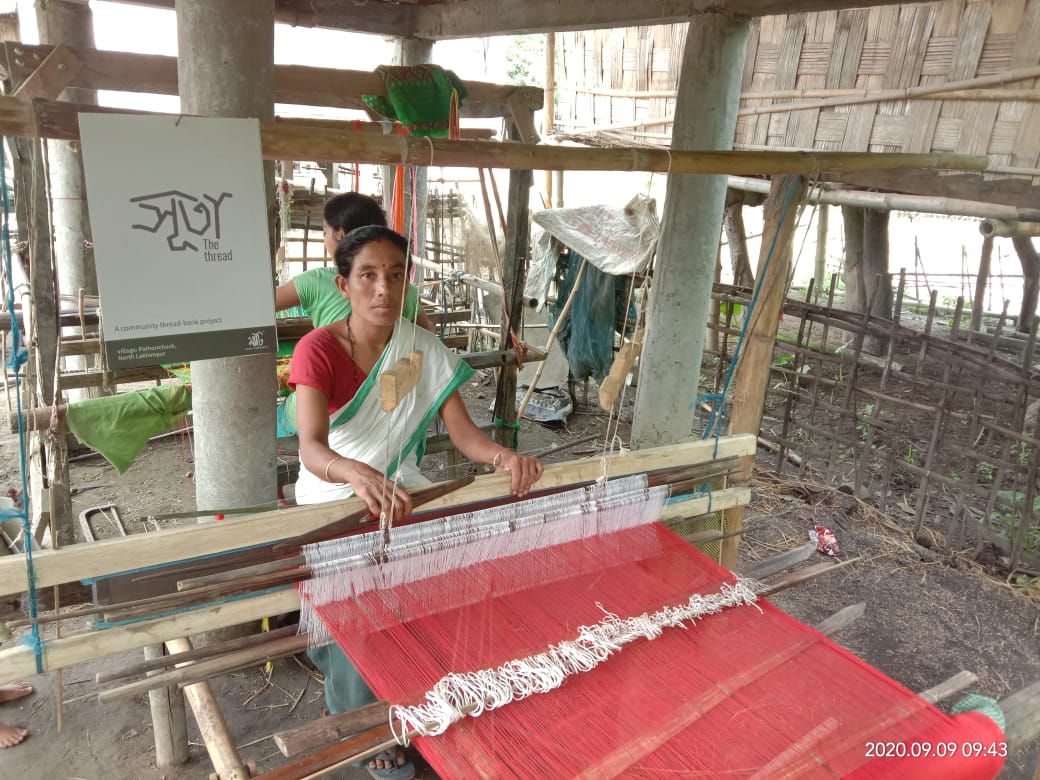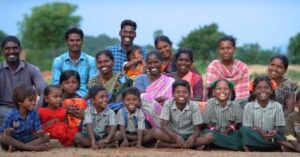How a Couple is Using Threads to Help 180 Assamese Women Increase Their Income
The women of the Mising community of Pathorichuk village in Assam are thrilled to be earning from their handloom weaving, and its all thanks to Rishi Raj Sarmah and Pabitra Lama Sarmah for setting up a thread initiative — Xuta.

“I have been weaving from a very young age but it is only now that I am getting paid for my efforts,’’ says 25-year-old Rumi Payeng. She along with her friends cannot believe that 10 days of work would instantly get them Rs 3,000. Moreover, they tell me that they were able to complete all their house and farm work even while earning an income.
They are women of Mising community of Pathorichuk village in north Lakhimpur of Majuli district in Assam, who now have a health insurance policy, a yarn passbook and a bank account thanks to their craft.
For them, handloom weaving is something they learn while sitting on their mother’s lap while she weaves. While earlier they wove traditional dresses like Ugon, Dumer and Ege only for their families or for special occasions like weddings, birth of a child, among others, now they have taken a commercial approach.
‘A sustainable village’
“Now, if my son wants something, I can easily buy it with this money plus the added money helps me pay for my children’s tuition fees,’’ admits 37-year-old Maina Payeng. A very happy Buleswari Payeng, adds, “I feel confident and safe with some extra money which I can use to buy dresses for my daughter.’’
The group of women proclaim in a mixture of Assamese and Hindi that they “now have added new items to our products like stoles and scarves for which we get good money”. The women are still using the same motifs of ghai yamik or the distinct diamond shapes for which the region is famous for.

This change in their life has been brought by Xuta, pronounced ‘Suta’, meaning — thread, is an initiative started by the Maati Community. “Xuta was started as a dream project to restore traditional handloom back to its root. We wanted to create a sustainable village model amongst the weavers of Pathorichuck. During a survey we conducted around March 2020, we found that nearly 70 per cent of women of 287 families of the village knew the traditional art of weaving but didn’t know they could market and earn from it,’’ explains Rishi Raj Sarmah, who along with his wife, Pabitra Lama Sarmah, had established Maati Community in Guwahati, Assam in 2014.
Agrarian village turns to weaving
Maati, as a center started as a place where the best of handicrafts, mainly from the Northeast and a few from other places in India, were sold. The husband-wife duo slowly started interacting with customers and realised their centre could be used as a platform for young artists, designers and entrepreneurs from different regions to exchange ideas, discuss their journey and tell stories through their performances. This formed the basis of Maati.
In Pathorichuck, as part of Maati’s activities, they started interacting with self help groups (SHGs) in and around Majuli, which is the world’s largest island district with 144 villages and is surrounded by river Brahmaputra, its anabranch and river Subansiri. The river Subansiri swells during the monsoon and the village becomes almost inaccessible.
During their interactions, Rishi elaborates on why Xuta was conceptualised. He says, “Predominantly an agriculture-based village and dominated by Mising tribals, Pathorichuck villagers’ lives, like others of Majuli, get affected by annual floods. All activities come to a standstill. This is when they just while away their time and feel helpless. And we wanted to help them use this time fruitfully and started the Xuta initiation.”

A women’s centre
In the pilot project that kicked off in August 2020, 10 women were identified from a SHG group in the village. By the time the project started, three more showed interest. Today, another 170 women have joined this project.
Here, each woman is given 3 kilos of good quality cotton thread with the colour of their choice, a health insurance policy worth Rs 2 lakh, a yarn passbook, a bank account in the Assam Gramin Bikash Bank, and a buy back mechanism.
“We also paid for repairs to their old traditional looms at home. For the first time a yarn passbook was given to each weaver so that they can keep a record of the amount of yarn they have used. We insist on a buy back mechanism as we don’t want any weaver to wait endlessly for payment for the work she has done,’’ Pabitra says.
Pathorichuck is about 12 hours away from Guwahati and so the Maati Community appointed a local tailor, Sanjay Payeng, who understands the nuances of weaving, to manage overseeing the entire process of distributing the yarn, packing and sending the finished goods back to the centre.
By 1 October 2020, the center had received 100 stoles, 10 from each woman. And much to the delight of the women, the weaving charges amounted to Rs 300 per stole, totaling Rs 3,000 per person, and was paid within 48 hours of depositing their work.
“This made them trust us. And as we had already spread the word through social media, within 72 hours everything was sold out. We charge Rs 690 per stole and sell them in wholesale with a minimum of 12 pieces. The wholesale works well, especially for designers and store owners,’’ says a proud Rishi.

Maati wants to involve women of neighbouring villages and try to include new designs in their weaving. “As these women know how to weave only geometrical designs, I plan to ask designer members of Maati for new motifs which they can be incorporated in their weaving,” says Rishi. Sanjay adds that he wants to teach women tailoring and embroidering, which, he believes, will help enhance their work. The founders of Maati also want to build a common center where these women can come to weave instead of doing it alone at home.
(Edited by Yoshita Rao)
If you found our stories insightful, informative, or even just enjoyable, we invite you to consider making a voluntary payment to support the work we do at The Better India. Your contribution helps us continue producing quality content that educates, inspires, and drives positive change.
Choose one of the payment options below for your contribution-
By paying for the stories you value, you directly contribute to sustaining our efforts focused on making a difference in the world. Together, let's ensure that impactful stories continue to be told and shared, enriching lives and communities alike.
Thank you for your support. Here are some frequently asked questions you might find helpful to know why you are contributing?


This story made me
-
97
-
121
-
89
-
167














